Strategic Board Paper: Managing International Trade of Assam Tea
VerifiedAdded on 2024/04/25
|15
|3271
|228
Report
AI Summary
This report provides a comprehensive analysis of Assam Secret's international tea trade strategy, focusing on exports to the UK market. It examines the current state of the Indian tea industry, the UK's import market, and the competitive landscape. The report recommends a shift towards exporting herbal tea alongside black tea, adopting an indirect selling approach through wholesalers and e-commerce platforms, and utilizing cash-in-advance payment methods to mitigate credit risks. It also considers the impact of Brexit, legal requirements in the UK, and ethical sourcing issues. The report further presents arguments for and against the recommendations, addressing political, economic, social, and legal risks, while also highlighting the benefits of risk mitigation strategies and efficient transportation. Finally, it outlines the implementation of these recommendations, emphasizing international expansion, safe payment options, and adherence to international trade theories.
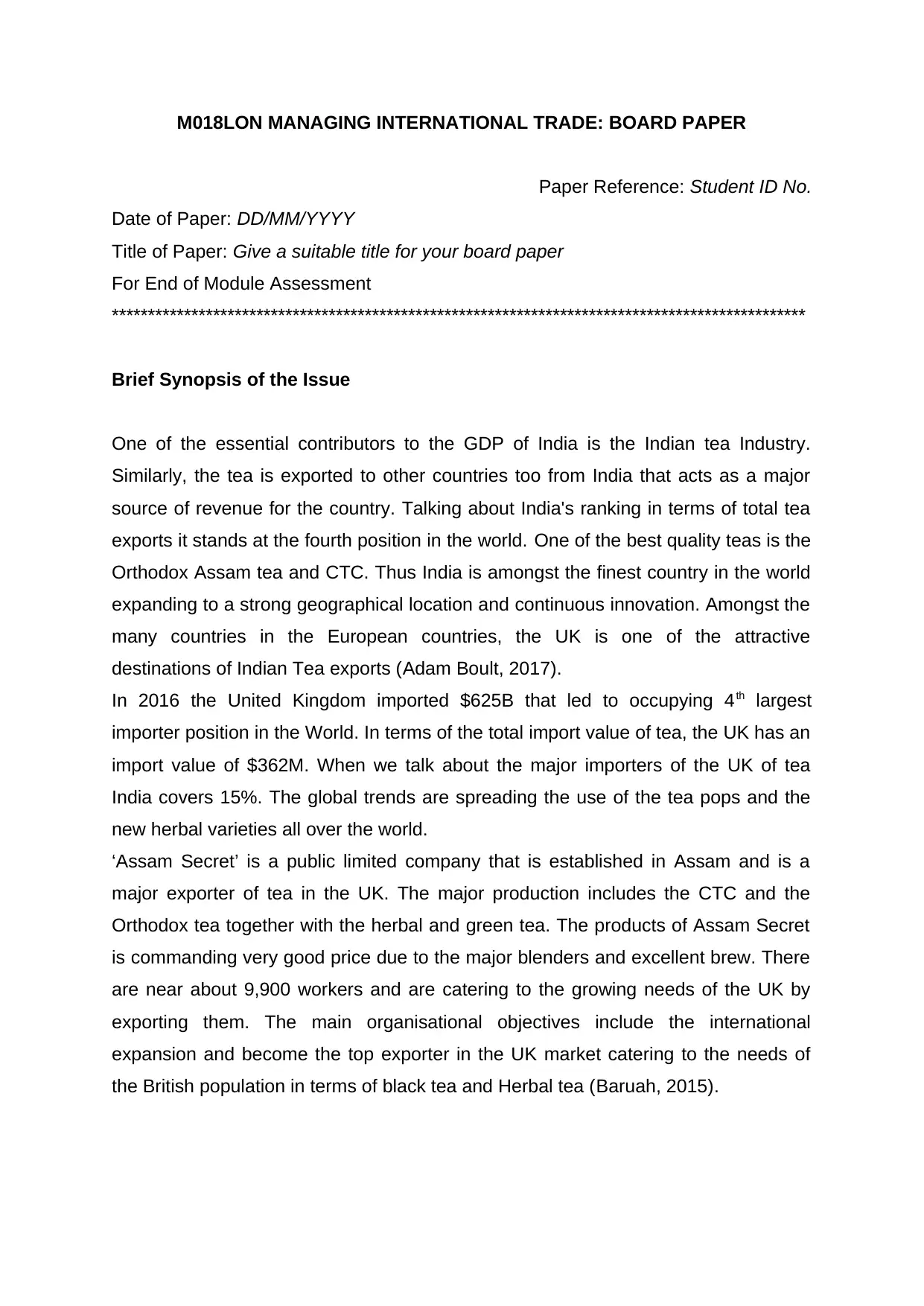
M018LON MANAGING INTERNATIONAL TRADE: BOARD PAPER
Paper Reference: Student ID No.
Date of Paper: DD/MM/YYYY
Title of Paper: Give a suitable title for your board paper
For End of Module Assessment
************************************************************************************************
Brief Synopsis of the Issue
One of the essential contributors to the GDP of India is the Indian tea Industry.
Similarly, the tea is exported to other countries too from India that acts as a major
source of revenue for the country. Talking about India's ranking in terms of total tea
exports it stands at the fourth position in the world. One of the best quality teas is the
Orthodox Assam tea and CTC. Thus India is amongst the finest country in the world
expanding to a strong geographical location and continuous innovation. Amongst the
many countries in the European countries, the UK is one of the attractive
destinations of Indian Tea exports (Adam Boult, 2017).
In 2016 the United Kingdom imported $625B that led to occupying 4th largest
importer position in the World. In terms of the total import value of tea, the UK has an
import value of $362M. When we talk about the major importers of the UK of tea
India covers 15%. The global trends are spreading the use of the tea pops and the
new herbal varieties all over the world.
‘Assam Secret’ is a public limited company that is established in Assam and is a
major exporter of tea in the UK. The major production includes the CTC and the
Orthodox tea together with the herbal and green tea. The products of Assam Secret
is commanding very good price due to the major blenders and excellent brew. There
are near about 9,900 workers and are catering to the growing needs of the UK by
exporting them. The main organisational objectives include the international
expansion and become the top exporter in the UK market catering to the needs of
the British population in terms of black tea and Herbal tea (Baruah, 2015).
Paper Reference: Student ID No.
Date of Paper: DD/MM/YYYY
Title of Paper: Give a suitable title for your board paper
For End of Module Assessment
************************************************************************************************
Brief Synopsis of the Issue
One of the essential contributors to the GDP of India is the Indian tea Industry.
Similarly, the tea is exported to other countries too from India that acts as a major
source of revenue for the country. Talking about India's ranking in terms of total tea
exports it stands at the fourth position in the world. One of the best quality teas is the
Orthodox Assam tea and CTC. Thus India is amongst the finest country in the world
expanding to a strong geographical location and continuous innovation. Amongst the
many countries in the European countries, the UK is one of the attractive
destinations of Indian Tea exports (Adam Boult, 2017).
In 2016 the United Kingdom imported $625B that led to occupying 4th largest
importer position in the World. In terms of the total import value of tea, the UK has an
import value of $362M. When we talk about the major importers of the UK of tea
India covers 15%. The global trends are spreading the use of the tea pops and the
new herbal varieties all over the world.
‘Assam Secret’ is a public limited company that is established in Assam and is a
major exporter of tea in the UK. The major production includes the CTC and the
Orthodox tea together with the herbal and green tea. The products of Assam Secret
is commanding very good price due to the major blenders and excellent brew. There
are near about 9,900 workers and are catering to the growing needs of the UK by
exporting them. The main organisational objectives include the international
expansion and become the top exporter in the UK market catering to the needs of
the British population in terms of black tea and Herbal tea (Baruah, 2015).
Paraphrase This Document
Need a fresh take? Get an instant paraphrase of this document with our AI Paraphraser
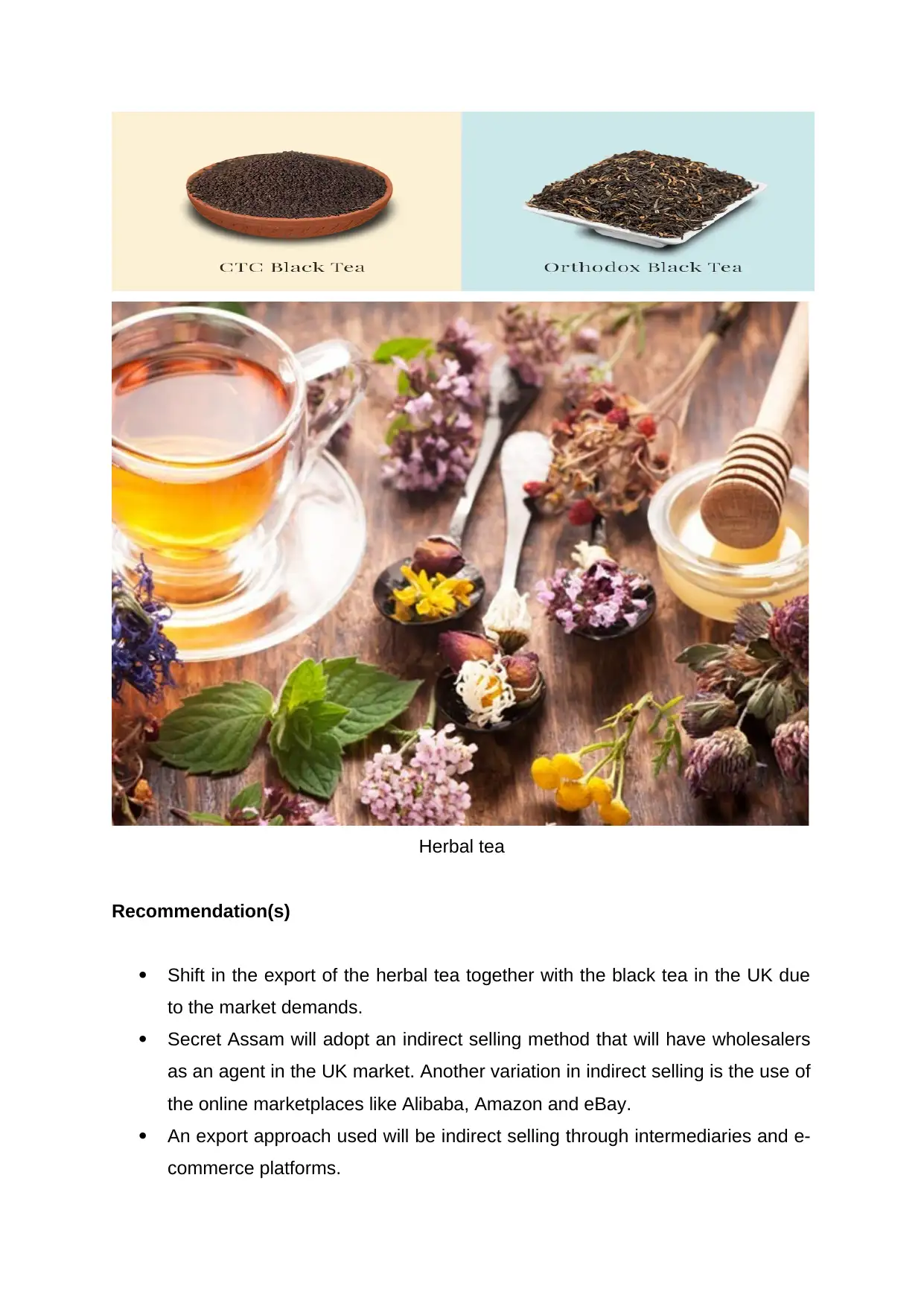
Herbal tea
Recommendation(s)
Shift in the export of the herbal tea together with the black tea in the UK due
to the market demands.
Secret Assam will adopt an indirect selling method that will have wholesalers
as an agent in the UK market. Another variation in indirect selling is the use of
the online marketplaces like Alibaba, Amazon and eBay.
An export approach used will be indirect selling through intermediaries and e-
commerce platforms.
Recommendation(s)
Shift in the export of the herbal tea together with the black tea in the UK due
to the market demands.
Secret Assam will adopt an indirect selling method that will have wholesalers
as an agent in the UK market. Another variation in indirect selling is the use of
the online marketplaces like Alibaba, Amazon and eBay.
An export approach used will be indirect selling through intermediaries and e-
commerce platforms.
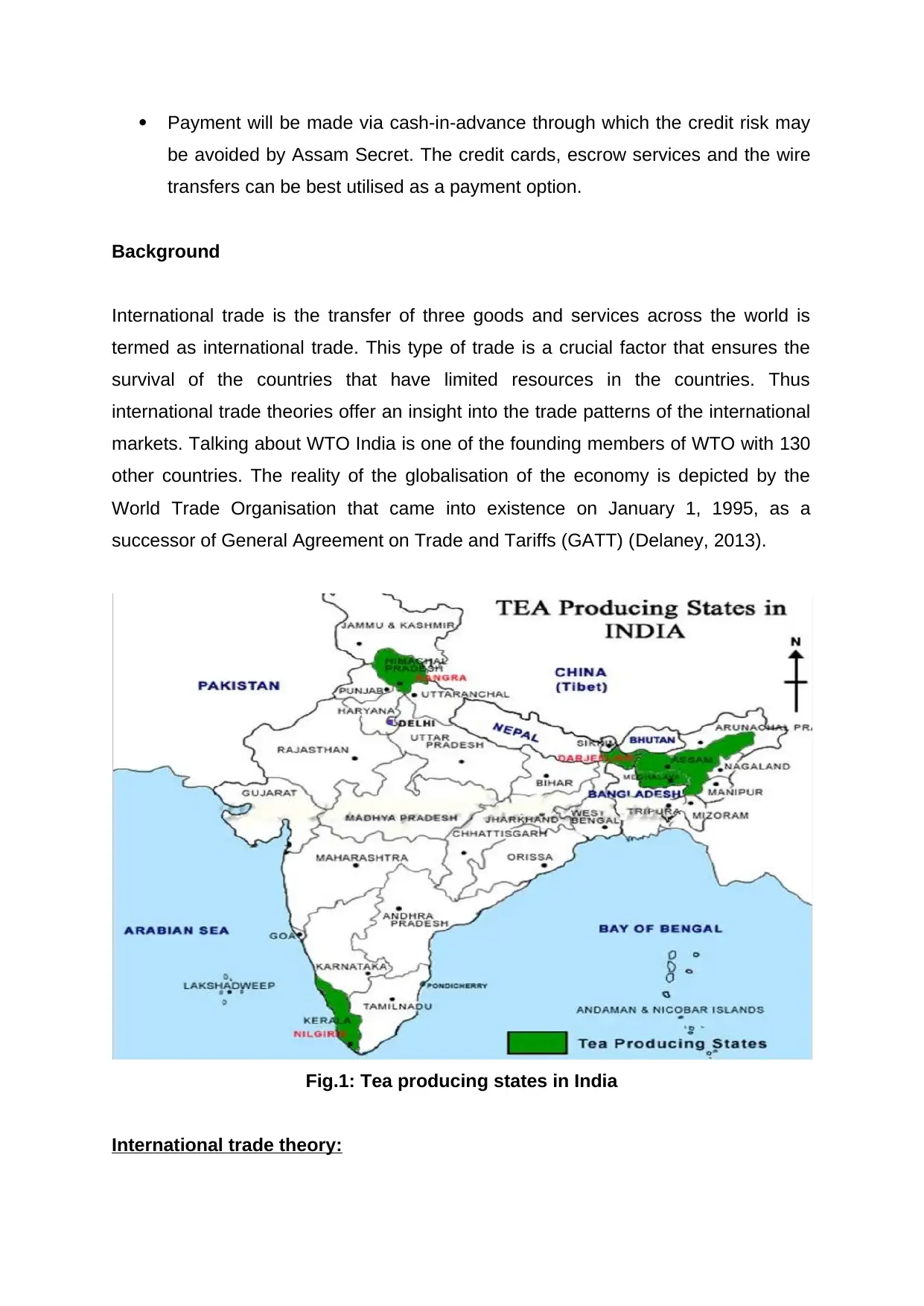
Payment will be made via cash-in-advance through which the credit risk may
be avoided by Assam Secret. The credit cards, escrow services and the wire
transfers can be best utilised as a payment option.
Background
International trade is the transfer of three goods and services across the world is
termed as international trade. This type of trade is a crucial factor that ensures the
survival of the countries that have limited resources in the countries. Thus
international trade theories offer an insight into the trade patterns of the international
markets. Talking about WTO India is one of the founding members of WTO with 130
other countries. The reality of the globalisation of the economy is depicted by the
World Trade Organisation that came into existence on January 1, 1995, as a
successor of General Agreement on Trade and Tariffs (GATT) (Delaney, 2013).
Fig.1: Tea producing states in India
International trade theory:
be avoided by Assam Secret. The credit cards, escrow services and the wire
transfers can be best utilised as a payment option.
Background
International trade is the transfer of three goods and services across the world is
termed as international trade. This type of trade is a crucial factor that ensures the
survival of the countries that have limited resources in the countries. Thus
international trade theories offer an insight into the trade patterns of the international
markets. Talking about WTO India is one of the founding members of WTO with 130
other countries. The reality of the globalisation of the economy is depicted by the
World Trade Organisation that came into existence on January 1, 1995, as a
successor of General Agreement on Trade and Tariffs (GATT) (Delaney, 2013).
Fig.1: Tea producing states in India
International trade theory:
⊘ This is a preview!⊘
Do you want full access?
Subscribe today to unlock all pages.

Trusted by 1+ million students worldwide
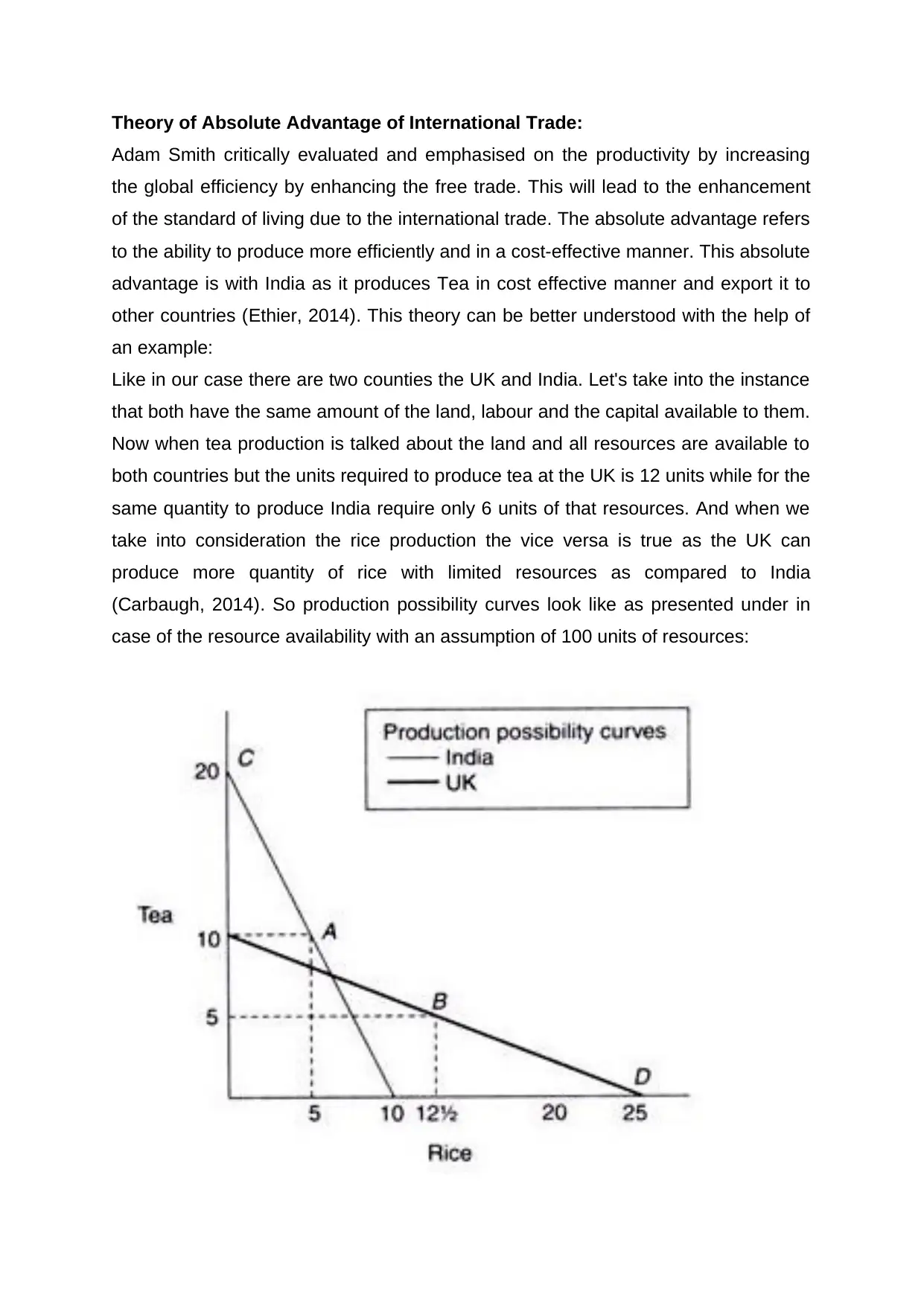
Theory of Absolute Advantage of International Trade:
Adam Smith critically evaluated and emphasised on the productivity by increasing
the global efficiency by enhancing the free trade. This will lead to the enhancement
of the standard of living due to the international trade. The absolute advantage refers
to the ability to produce more efficiently and in a cost-effective manner. This absolute
advantage is with India as it produces Tea in cost effective manner and export it to
other countries (Ethier, 2014). This theory can be better understood with the help of
an example:
Like in our case there are two counties the UK and India. Let's take into the instance
that both have the same amount of the land, labour and the capital available to them.
Now when tea production is talked about the land and all resources are available to
both countries but the units required to produce tea at the UK is 12 units while for the
same quantity to produce India require only 6 units of that resources. And when we
take into consideration the rice production the vice versa is true as the UK can
produce more quantity of rice with limited resources as compared to India
(Carbaugh, 2014). So production possibility curves look like as presented under in
case of the resource availability with an assumption of 100 units of resources:
Adam Smith critically evaluated and emphasised on the productivity by increasing
the global efficiency by enhancing the free trade. This will lead to the enhancement
of the standard of living due to the international trade. The absolute advantage refers
to the ability to produce more efficiently and in a cost-effective manner. This absolute
advantage is with India as it produces Tea in cost effective manner and export it to
other countries (Ethier, 2014). This theory can be better understood with the help of
an example:
Like in our case there are two counties the UK and India. Let's take into the instance
that both have the same amount of the land, labour and the capital available to them.
Now when tea production is talked about the land and all resources are available to
both countries but the units required to produce tea at the UK is 12 units while for the
same quantity to produce India require only 6 units of that resources. And when we
take into consideration the rice production the vice versa is true as the UK can
produce more quantity of rice with limited resources as compared to India
(Carbaugh, 2014). So production possibility curves look like as presented under in
case of the resource availability with an assumption of 100 units of resources:
Paraphrase This Document
Need a fresh take? Get an instant paraphrase of this document with our AI Paraphraser
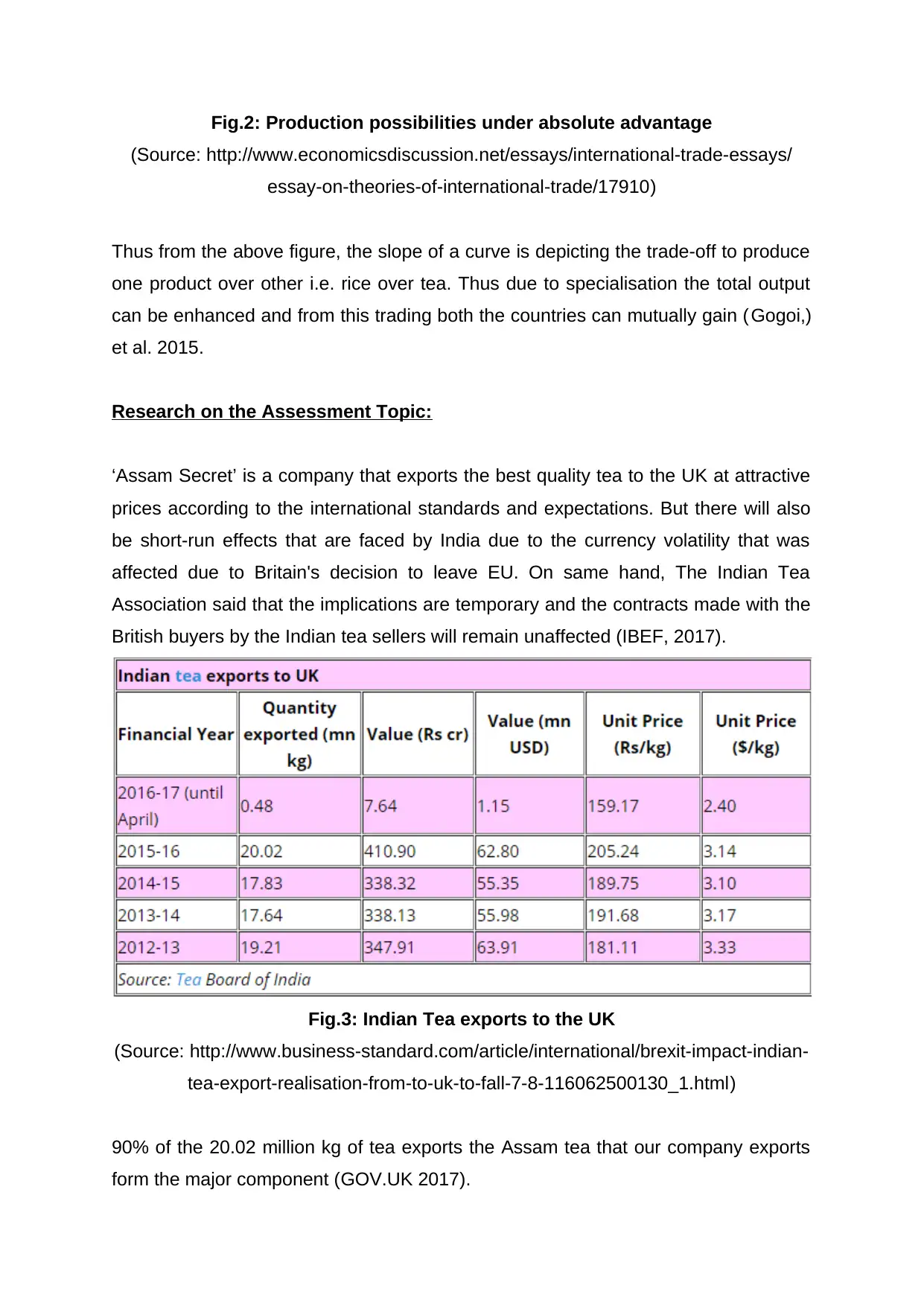
Fig.2: Production possibilities under absolute advantage
(Source: http://www.economicsdiscussion.net/essays/international-trade-essays/
essay-on-theories-of-international-trade/17910)
Thus from the above figure, the slope of a curve is depicting the trade-off to produce
one product over other i.e. rice over tea. Thus due to specialisation the total output
can be enhanced and from this trading both the countries can mutually gain (Gogoi,)
et al. 2015.
Research on the Assessment Topic:
‘Assam Secret’ is a company that exports the best quality tea to the UK at attractive
prices according to the international standards and expectations. But there will also
be short-run effects that are faced by India due to the currency volatility that was
affected due to Britain's decision to leave EU. On same hand, The Indian Tea
Association said that the implications are temporary and the contracts made with the
British buyers by the Indian tea sellers will remain unaffected (IBEF, 2017).
Fig.3: Indian Tea exports to the UK
(Source: http://www.business-standard.com/article/international/brexit-impact-indian-
tea-export-realisation-from-to-uk-to-fall-7-8-116062500130_1.html)
90% of the 20.02 million kg of tea exports the Assam tea that our company exports
form the major component (GOV.UK 2017).
(Source: http://www.economicsdiscussion.net/essays/international-trade-essays/
essay-on-theories-of-international-trade/17910)
Thus from the above figure, the slope of a curve is depicting the trade-off to produce
one product over other i.e. rice over tea. Thus due to specialisation the total output
can be enhanced and from this trading both the countries can mutually gain (Gogoi,)
et al. 2015.
Research on the Assessment Topic:
‘Assam Secret’ is a company that exports the best quality tea to the UK at attractive
prices according to the international standards and expectations. But there will also
be short-run effects that are faced by India due to the currency volatility that was
affected due to Britain's decision to leave EU. On same hand, The Indian Tea
Association said that the implications are temporary and the contracts made with the
British buyers by the Indian tea sellers will remain unaffected (IBEF, 2017).
Fig.3: Indian Tea exports to the UK
(Source: http://www.business-standard.com/article/international/brexit-impact-indian-
tea-export-realisation-from-to-uk-to-fall-7-8-116062500130_1.html)
90% of the 20.02 million kg of tea exports the Assam tea that our company exports
form the major component (GOV.UK 2017).
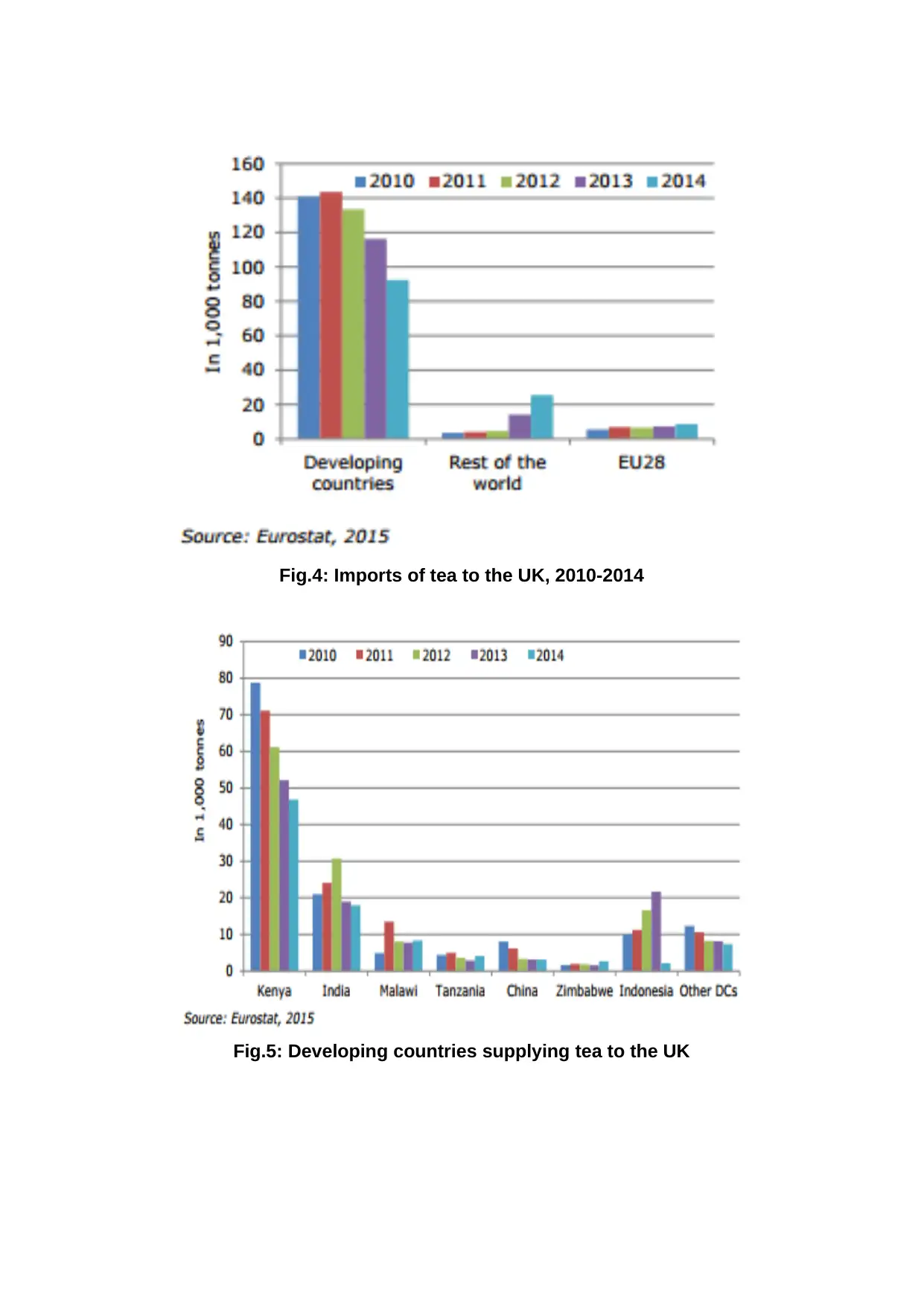
Fig.4: Imports of tea to the UK, 2010-2014
Fig.5: Developing countries supplying tea to the UK
Fig.5: Developing countries supplying tea to the UK
⊘ This is a preview!⊘
Do you want full access?
Subscribe today to unlock all pages.

Trusted by 1+ million students worldwide
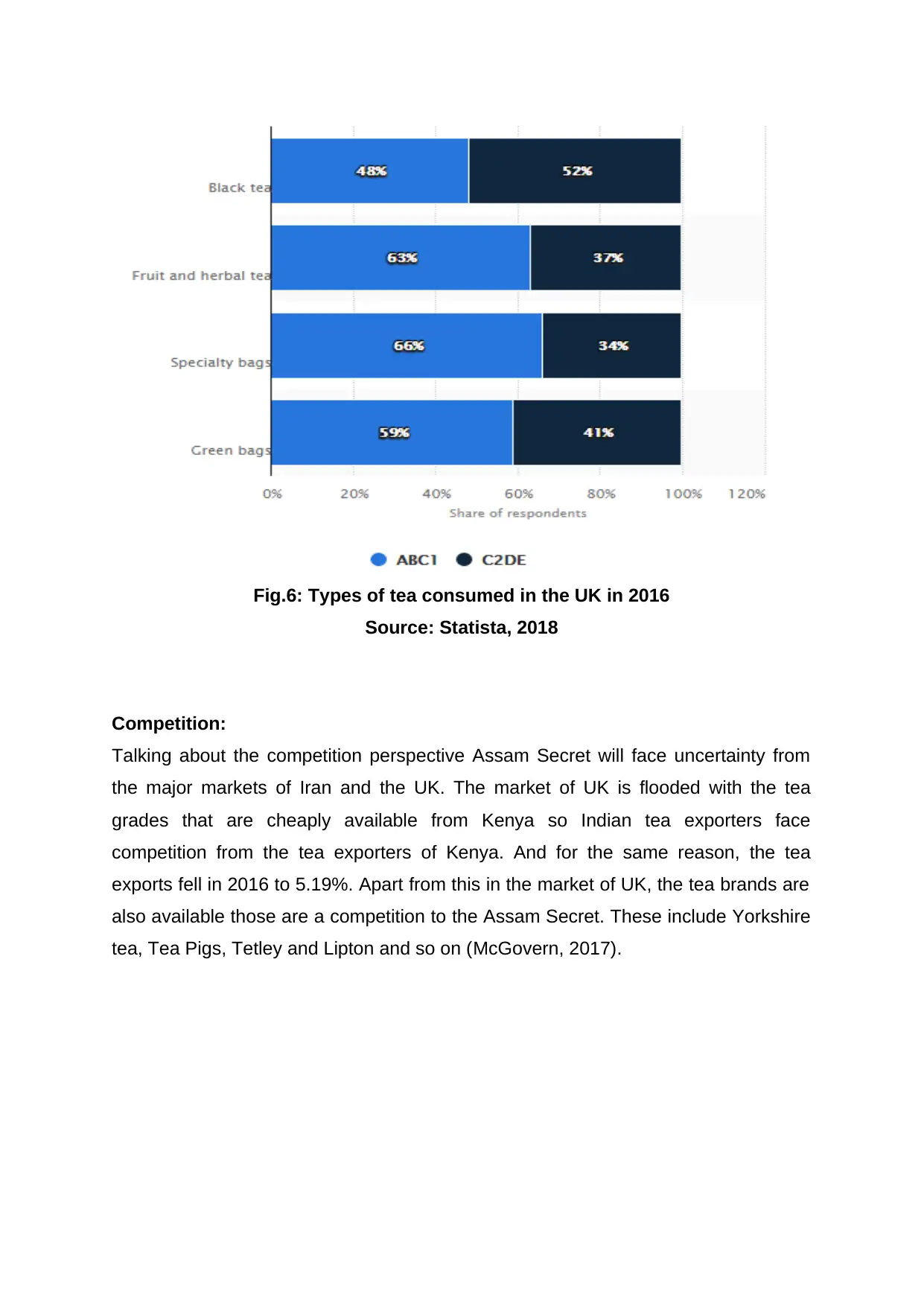
Fig.6: Types of tea consumed in the UK in 2016
Source: Statista, 2018
Competition:
Talking about the competition perspective Assam Secret will face uncertainty from
the major markets of Iran and the UK. The market of UK is flooded with the tea
grades that are cheaply available from Kenya so Indian tea exporters face
competition from the tea exporters of Kenya. And for the same reason, the tea
exports fell in 2016 to 5.19%. Apart from this in the market of UK, the tea brands are
also available those are a competition to the Assam Secret. These include Yorkshire
tea, Tea Pigs, Tetley and Lipton and so on (McGovern, 2017).
Source: Statista, 2018
Competition:
Talking about the competition perspective Assam Secret will face uncertainty from
the major markets of Iran and the UK. The market of UK is flooded with the tea
grades that are cheaply available from Kenya so Indian tea exporters face
competition from the tea exporters of Kenya. And for the same reason, the tea
exports fell in 2016 to 5.19%. Apart from this in the market of UK, the tea brands are
also available those are a competition to the Assam Secret. These include Yorkshire
tea, Tea Pigs, Tetley and Lipton and so on (McGovern, 2017).
Paraphrase This Document
Need a fresh take? Get an instant paraphrase of this document with our AI Paraphraser
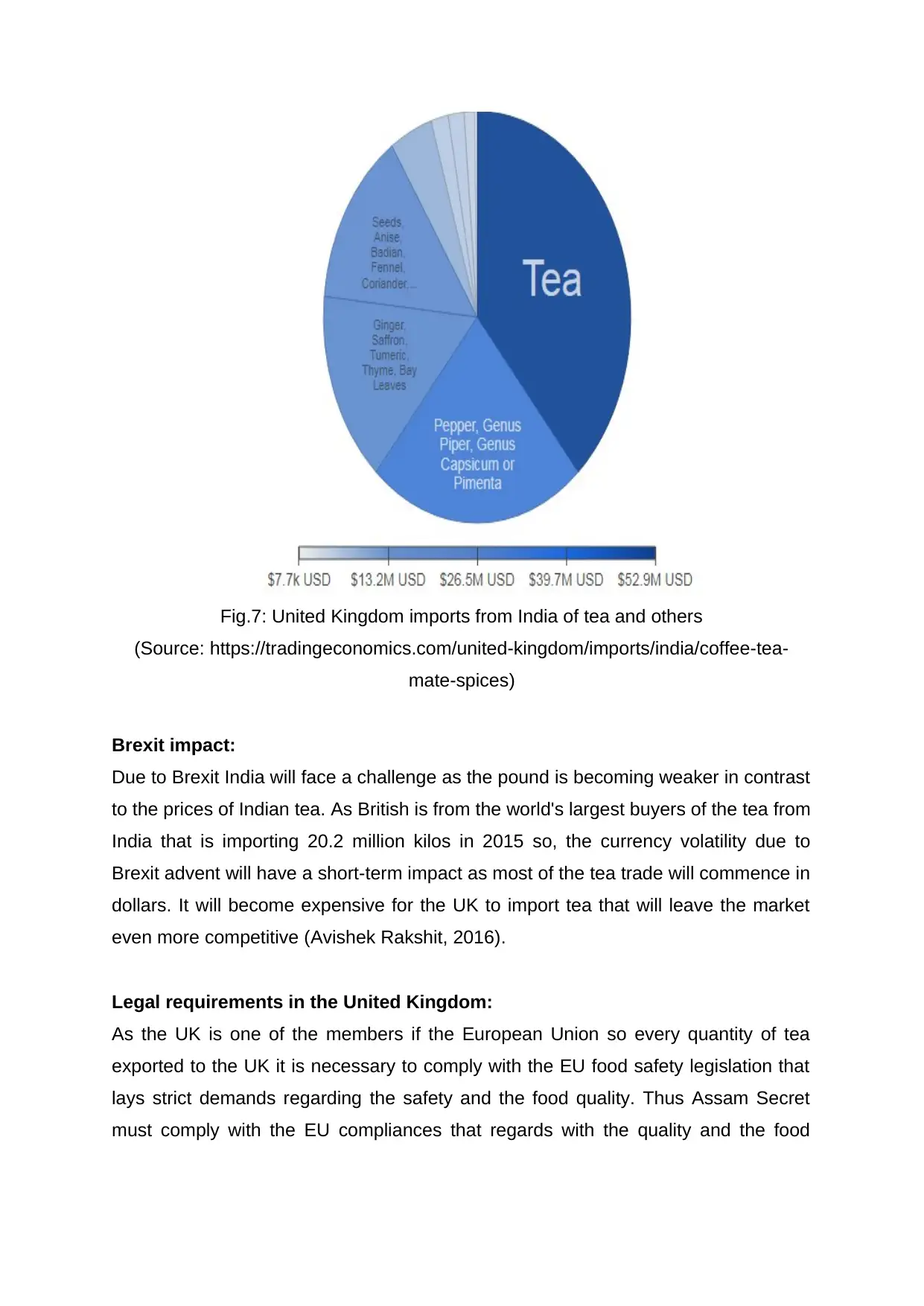
Fig.7: United Kingdom imports from India of tea and others
(Source: https://tradingeconomics.com/united-kingdom/imports/india/coffee-tea-
mate-spices)
Brexit impact:
Due to Brexit India will face a challenge as the pound is becoming weaker in contrast
to the prices of Indian tea. As British is from the world's largest buyers of the tea from
India that is importing 20.2 million kilos in 2015 so, the currency volatility due to
Brexit advent will have a short-term impact as most of the tea trade will commence in
dollars. It will become expensive for the UK to import tea that will leave the market
even more competitive (Avishek Rakshit, 2016).
Legal requirements in the United Kingdom:
As the UK is one of the members if the European Union so every quantity of tea
exported to the UK it is necessary to comply with the EU food safety legislation that
lays strict demands regarding the safety and the food quality. Thus Assam Secret
must comply with the EU compliances that regards with the quality and the food
(Source: https://tradingeconomics.com/united-kingdom/imports/india/coffee-tea-
mate-spices)
Brexit impact:
Due to Brexit India will face a challenge as the pound is becoming weaker in contrast
to the prices of Indian tea. As British is from the world's largest buyers of the tea from
India that is importing 20.2 million kilos in 2015 so, the currency volatility due to
Brexit advent will have a short-term impact as most of the tea trade will commence in
dollars. It will become expensive for the UK to import tea that will leave the market
even more competitive (Avishek Rakshit, 2016).
Legal requirements in the United Kingdom:
As the UK is one of the members if the European Union so every quantity of tea
exported to the UK it is necessary to comply with the EU food safety legislation that
lays strict demands regarding the safety and the food quality. Thus Assam Secret
must comply with the EU compliances that regards with the quality and the food
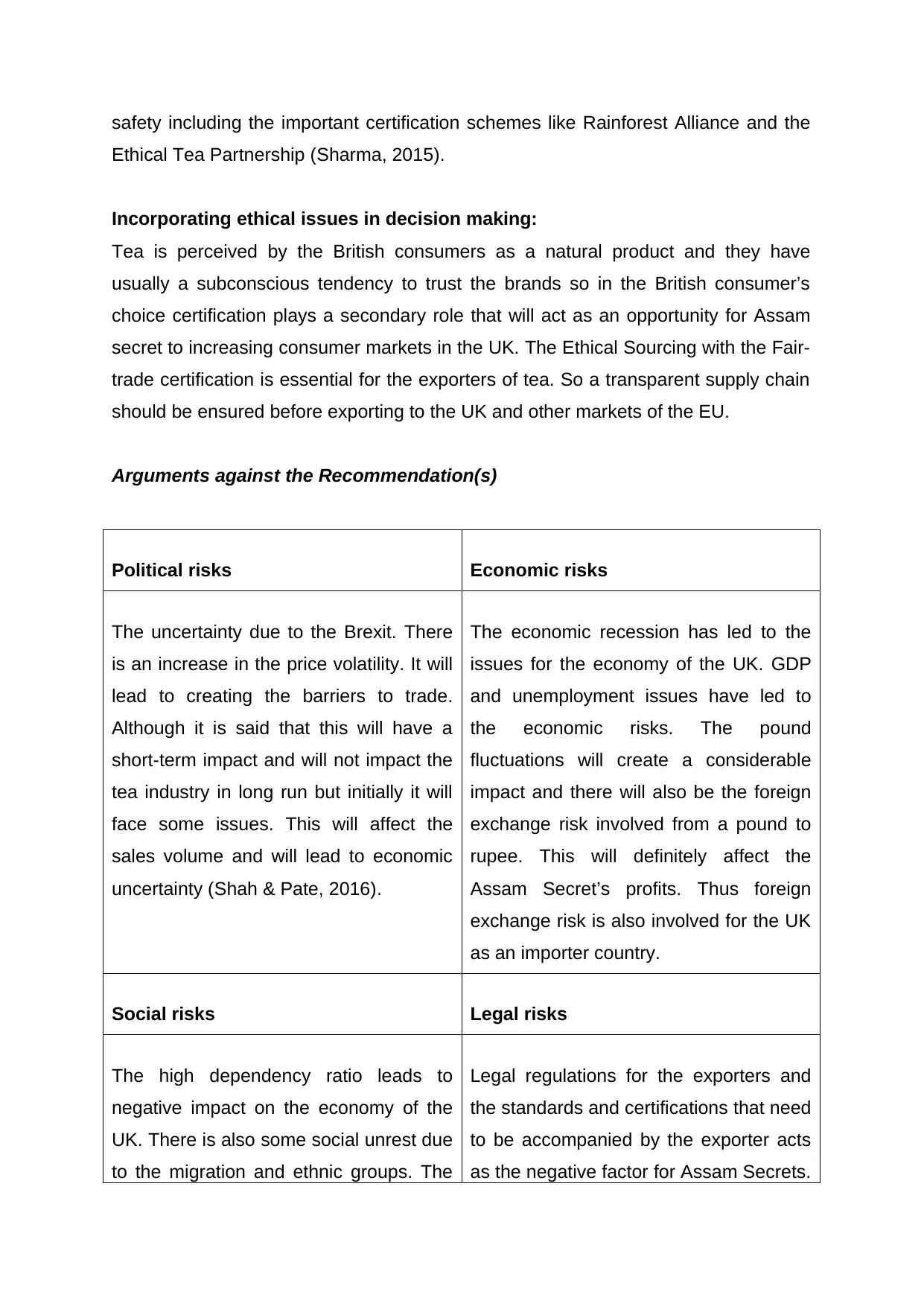
safety including the important certification schemes like Rainforest Alliance and the
Ethical Tea Partnership (Sharma, 2015).
Incorporating ethical issues in decision making:
Tea is perceived by the British consumers as a natural product and they have
usually a subconscious tendency to trust the brands so in the British consumer’s
choice certification plays a secondary role that will act as an opportunity for Assam
secret to increasing consumer markets in the UK. The Ethical Sourcing with the Fair-
trade certification is essential for the exporters of tea. So a transparent supply chain
should be ensured before exporting to the UK and other markets of the EU.
Arguments against the Recommendation(s)
Political risks Economic risks
The uncertainty due to the Brexit. There
is an increase in the price volatility. It will
lead to creating the barriers to trade.
Although it is said that this will have a
short-term impact and will not impact the
tea industry in long run but initially it will
face some issues. This will affect the
sales volume and will lead to economic
uncertainty (Shah & Pate, 2016).
The economic recession has led to the
issues for the economy of the UK. GDP
and unemployment issues have led to
the economic risks. The pound
fluctuations will create a considerable
impact and there will also be the foreign
exchange risk involved from a pound to
rupee. This will definitely affect the
Assam Secret’s profits. Thus foreign
exchange risk is also involved for the UK
as an importer country.
Social risks Legal risks
The high dependency ratio leads to
negative impact on the economy of the
UK. There is also some social unrest due
to the migration and ethnic groups. The
Legal regulations for the exporters and
the standards and certifications that need
to be accompanied by the exporter acts
as the negative factor for Assam Secrets.
Ethical Tea Partnership (Sharma, 2015).
Incorporating ethical issues in decision making:
Tea is perceived by the British consumers as a natural product and they have
usually a subconscious tendency to trust the brands so in the British consumer’s
choice certification plays a secondary role that will act as an opportunity for Assam
secret to increasing consumer markets in the UK. The Ethical Sourcing with the Fair-
trade certification is essential for the exporters of tea. So a transparent supply chain
should be ensured before exporting to the UK and other markets of the EU.
Arguments against the Recommendation(s)
Political risks Economic risks
The uncertainty due to the Brexit. There
is an increase in the price volatility. It will
lead to creating the barriers to trade.
Although it is said that this will have a
short-term impact and will not impact the
tea industry in long run but initially it will
face some issues. This will affect the
sales volume and will lead to economic
uncertainty (Shah & Pate, 2016).
The economic recession has led to the
issues for the economy of the UK. GDP
and unemployment issues have led to
the economic risks. The pound
fluctuations will create a considerable
impact and there will also be the foreign
exchange risk involved from a pound to
rupee. This will definitely affect the
Assam Secret’s profits. Thus foreign
exchange risk is also involved for the UK
as an importer country.
Social risks Legal risks
The high dependency ratio leads to
negative impact on the economy of the
UK. There is also some social unrest due
to the migration and ethnic groups. The
Legal regulations for the exporters and
the standards and certifications that need
to be accompanied by the exporter acts
as the negative factor for Assam Secrets.
⊘ This is a preview!⊘
Do you want full access?
Subscribe today to unlock all pages.

Trusted by 1+ million students worldwide
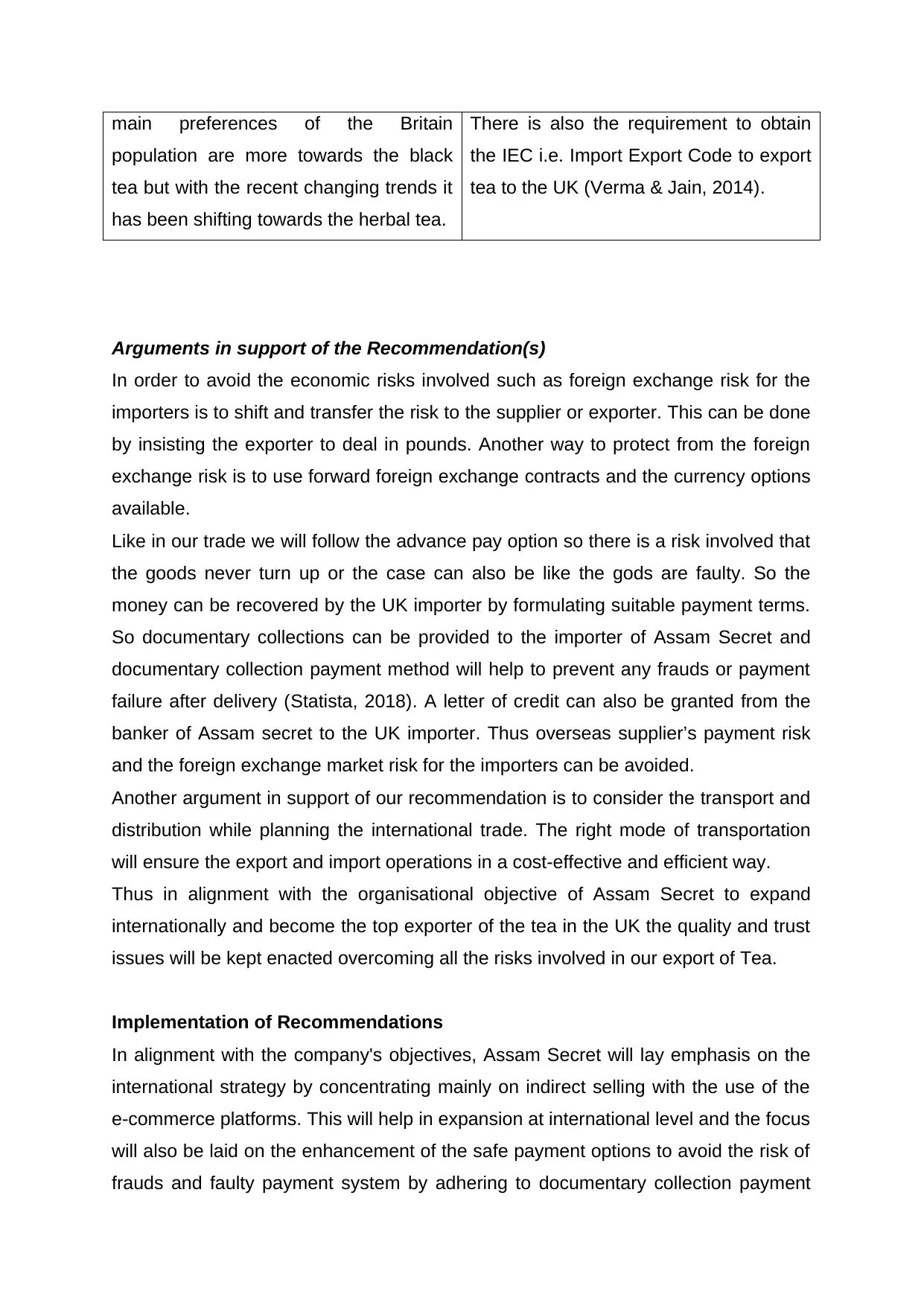
main preferences of the Britain
population are more towards the black
tea but with the recent changing trends it
has been shifting towards the herbal tea.
There is also the requirement to obtain
the IEC i.e. Import Export Code to export
tea to the UK (Verma & Jain, 2014).
Arguments in support of the Recommendation(s)
In order to avoid the economic risks involved such as foreign exchange risk for the
importers is to shift and transfer the risk to the supplier or exporter. This can be done
by insisting the exporter to deal in pounds. Another way to protect from the foreign
exchange risk is to use forward foreign exchange contracts and the currency options
available.
Like in our trade we will follow the advance pay option so there is a risk involved that
the goods never turn up or the case can also be like the gods are faulty. So the
money can be recovered by the UK importer by formulating suitable payment terms.
So documentary collections can be provided to the importer of Assam Secret and
documentary collection payment method will help to prevent any frauds or payment
failure after delivery (Statista, 2018). A letter of credit can also be granted from the
banker of Assam secret to the UK importer. Thus overseas supplier’s payment risk
and the foreign exchange market risk for the importers can be avoided.
Another argument in support of our recommendation is to consider the transport and
distribution while planning the international trade. The right mode of transportation
will ensure the export and import operations in a cost-effective and efficient way.
Thus in alignment with the organisational objective of Assam Secret to expand
internationally and become the top exporter of the tea in the UK the quality and trust
issues will be kept enacted overcoming all the risks involved in our export of Tea.
Implementation of Recommendations
In alignment with the company's objectives, Assam Secret will lay emphasis on the
international strategy by concentrating mainly on indirect selling with the use of the
e-commerce platforms. This will help in expansion at international level and the focus
will also be laid on the enhancement of the safe payment options to avoid the risk of
frauds and faulty payment system by adhering to documentary collection payment
population are more towards the black
tea but with the recent changing trends it
has been shifting towards the herbal tea.
There is also the requirement to obtain
the IEC i.e. Import Export Code to export
tea to the UK (Verma & Jain, 2014).
Arguments in support of the Recommendation(s)
In order to avoid the economic risks involved such as foreign exchange risk for the
importers is to shift and transfer the risk to the supplier or exporter. This can be done
by insisting the exporter to deal in pounds. Another way to protect from the foreign
exchange risk is to use forward foreign exchange contracts and the currency options
available.
Like in our trade we will follow the advance pay option so there is a risk involved that
the goods never turn up or the case can also be like the gods are faulty. So the
money can be recovered by the UK importer by formulating suitable payment terms.
So documentary collections can be provided to the importer of Assam Secret and
documentary collection payment method will help to prevent any frauds or payment
failure after delivery (Statista, 2018). A letter of credit can also be granted from the
banker of Assam secret to the UK importer. Thus overseas supplier’s payment risk
and the foreign exchange market risk for the importers can be avoided.
Another argument in support of our recommendation is to consider the transport and
distribution while planning the international trade. The right mode of transportation
will ensure the export and import operations in a cost-effective and efficient way.
Thus in alignment with the organisational objective of Assam Secret to expand
internationally and become the top exporter of the tea in the UK the quality and trust
issues will be kept enacted overcoming all the risks involved in our export of Tea.
Implementation of Recommendations
In alignment with the company's objectives, Assam Secret will lay emphasis on the
international strategy by concentrating mainly on indirect selling with the use of the
e-commerce platforms. This will help in expansion at international level and the focus
will also be laid on the enhancement of the safe payment options to avoid the risk of
frauds and faulty payment system by adhering to documentary collection payment
Paraphrase This Document
Need a fresh take? Get an instant paraphrase of this document with our AI Paraphraser
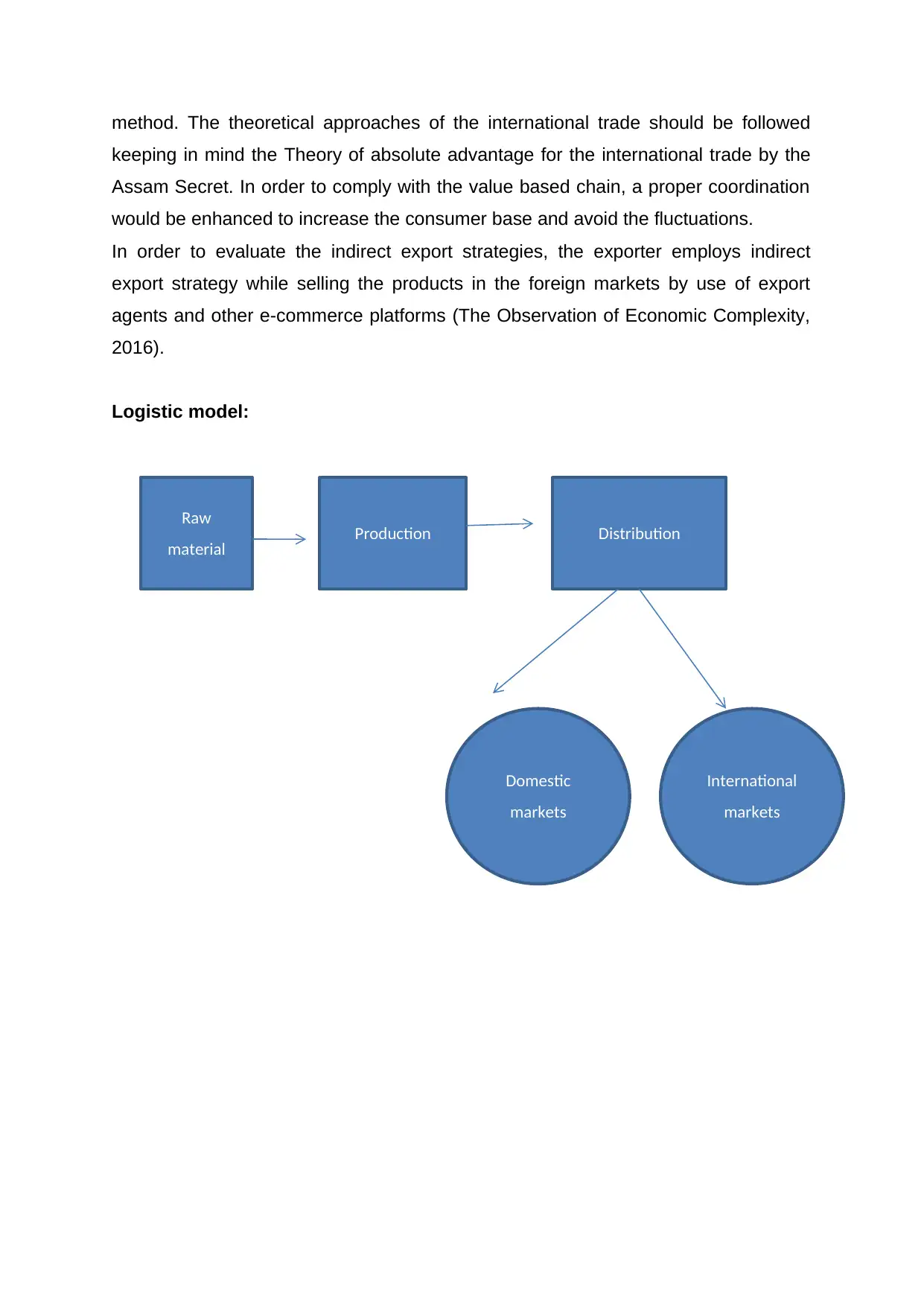
method. The theoretical approaches of the international trade should be followed
keeping in mind the Theory of absolute advantage for the international trade by the
Assam Secret. In order to comply with the value based chain, a proper coordination
would be enhanced to increase the consumer base and avoid the fluctuations.
In order to evaluate the indirect export strategies, the exporter employs indirect
export strategy while selling the products in the foreign markets by use of export
agents and other e-commerce platforms (The Observation of Economic Complexity,
2016).
Logistic model:
Raw
material Production Distribution
Domestic
markets
International
markets
keeping in mind the Theory of absolute advantage for the international trade by the
Assam Secret. In order to comply with the value based chain, a proper coordination
would be enhanced to increase the consumer base and avoid the fluctuations.
In order to evaluate the indirect export strategies, the exporter employs indirect
export strategy while selling the products in the foreign markets by use of export
agents and other e-commerce platforms (The Observation of Economic Complexity,
2016).
Logistic model:
Raw
material Production Distribution
Domestic
markets
International
markets
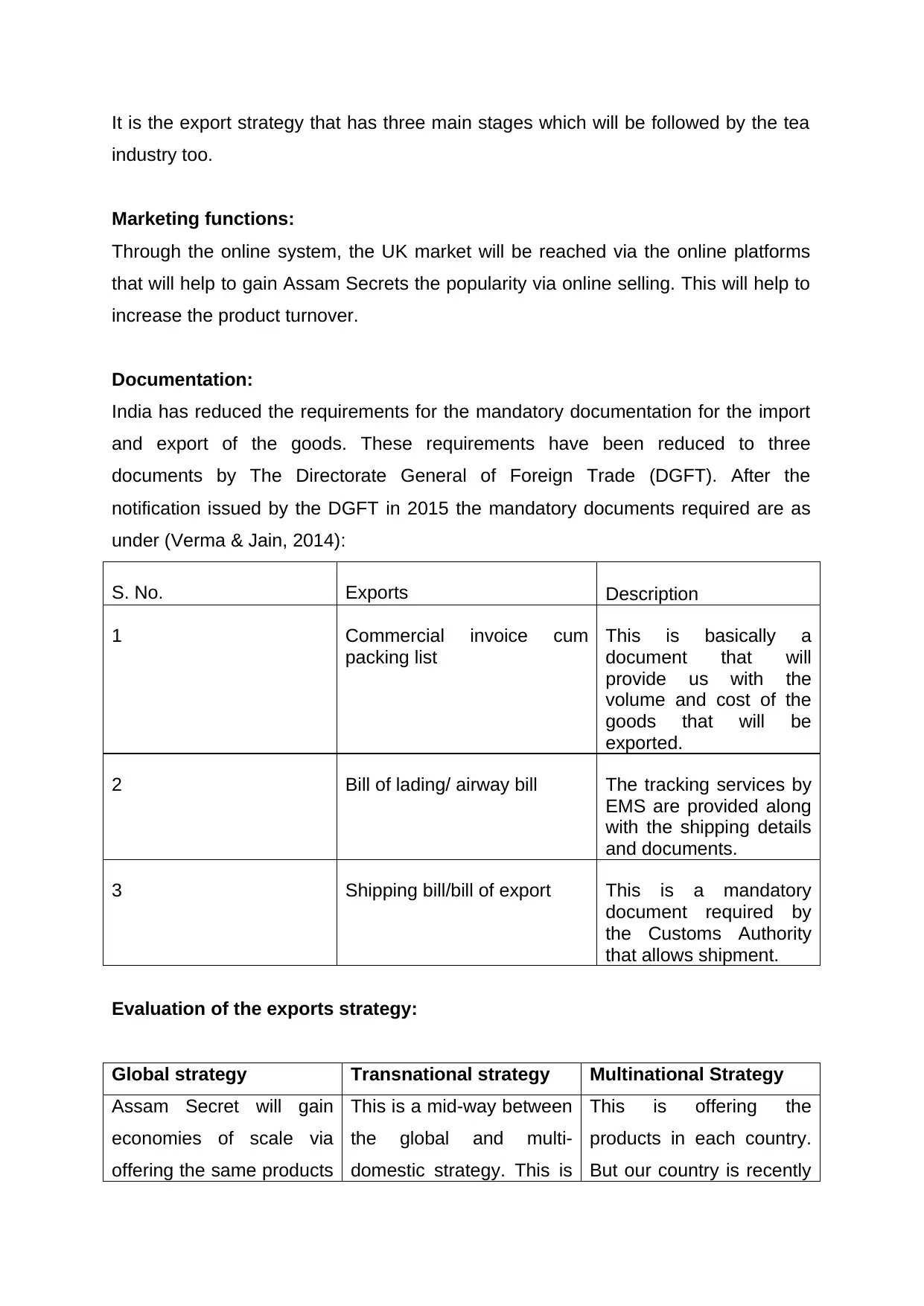
It is the export strategy that has three main stages which will be followed by the tea
industry too.
Marketing functions:
Through the online system, the UK market will be reached via the online platforms
that will help to gain Assam Secrets the popularity via online selling. This will help to
increase the product turnover.
Documentation:
India has reduced the requirements for the mandatory documentation for the import
and export of the goods. These requirements have been reduced to three
documents by The Directorate General of Foreign Trade (DGFT). After the
notification issued by the DGFT in 2015 the mandatory documents required are as
under (Verma & Jain, 2014):
S. No. Exports Description
1 Commercial invoice cum
packing list
This is basically a
document that will
provide us with the
volume and cost of the
goods that will be
exported.
2 Bill of lading/ airway bill The tracking services by
EMS are provided along
with the shipping details
and documents.
3 Shipping bill/bill of export This is a mandatory
document required by
the Customs Authority
that allows shipment.
Evaluation of the exports strategy:
Global strategy Transnational strategy Multinational Strategy
Assam Secret will gain
economies of scale via
offering the same products
This is a mid-way between
the global and multi-
domestic strategy. This is
This is offering the
products in each country.
But our country is recently
industry too.
Marketing functions:
Through the online system, the UK market will be reached via the online platforms
that will help to gain Assam Secrets the popularity via online selling. This will help to
increase the product turnover.
Documentation:
India has reduced the requirements for the mandatory documentation for the import
and export of the goods. These requirements have been reduced to three
documents by The Directorate General of Foreign Trade (DGFT). After the
notification issued by the DGFT in 2015 the mandatory documents required are as
under (Verma & Jain, 2014):
S. No. Exports Description
1 Commercial invoice cum
packing list
This is basically a
document that will
provide us with the
volume and cost of the
goods that will be
exported.
2 Bill of lading/ airway bill The tracking services by
EMS are provided along
with the shipping details
and documents.
3 Shipping bill/bill of export This is a mandatory
document required by
the Customs Authority
that allows shipment.
Evaluation of the exports strategy:
Global strategy Transnational strategy Multinational Strategy
Assam Secret will gain
economies of scale via
offering the same products
This is a mid-way between
the global and multi-
domestic strategy. This is
This is offering the
products in each country.
But our country is recently
⊘ This is a preview!⊘
Do you want full access?
Subscribe today to unlock all pages.

Trusted by 1+ million students worldwide
1 out of 15
Your All-in-One AI-Powered Toolkit for Academic Success.
+13062052269
info@desklib.com
Available 24*7 on WhatsApp / Email
![[object Object]](/_next/static/media/star-bottom.7253800d.svg)
Unlock your academic potential
Copyright © 2020–2025 A2Z Services. All Rights Reserved. Developed and managed by ZUCOL.

